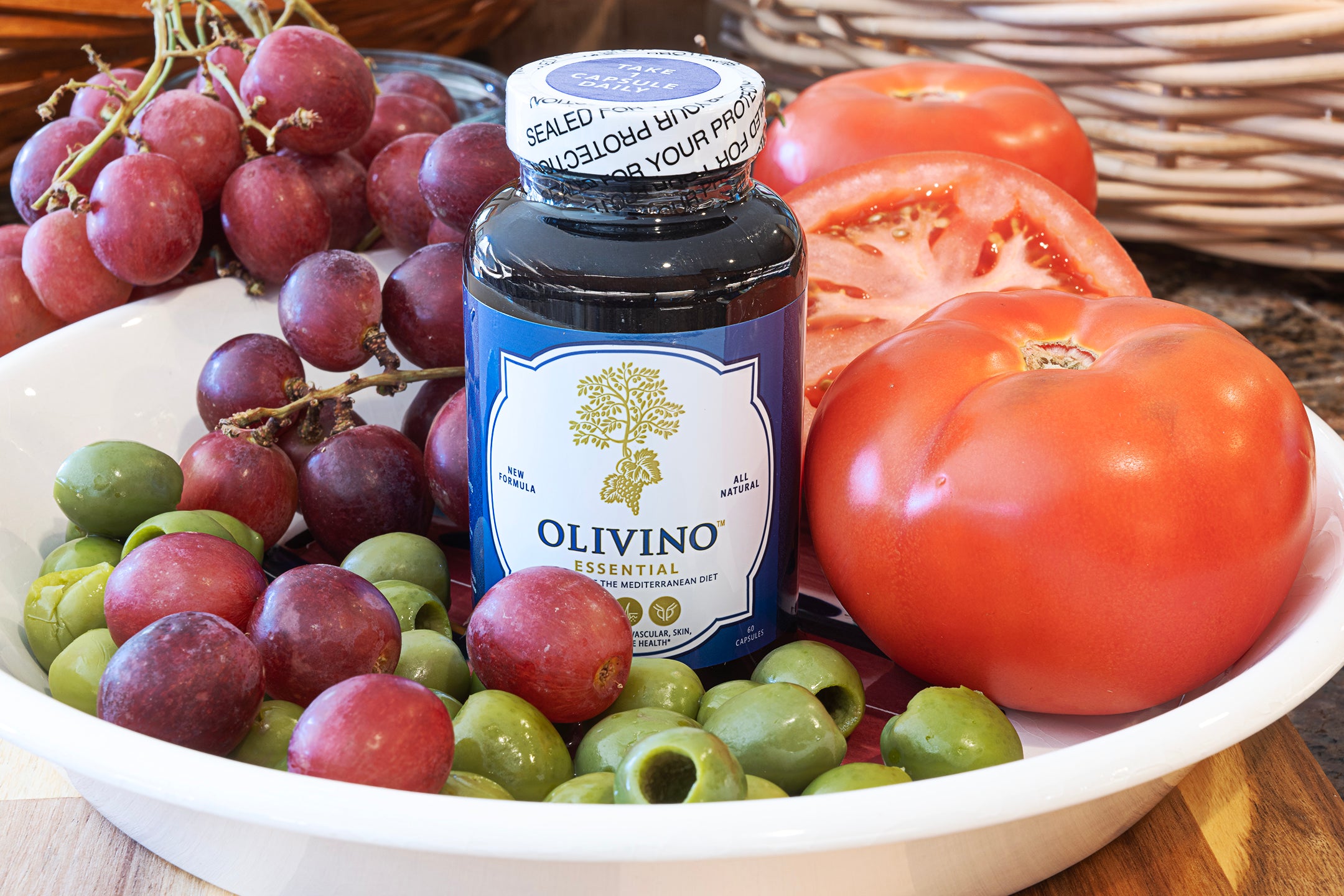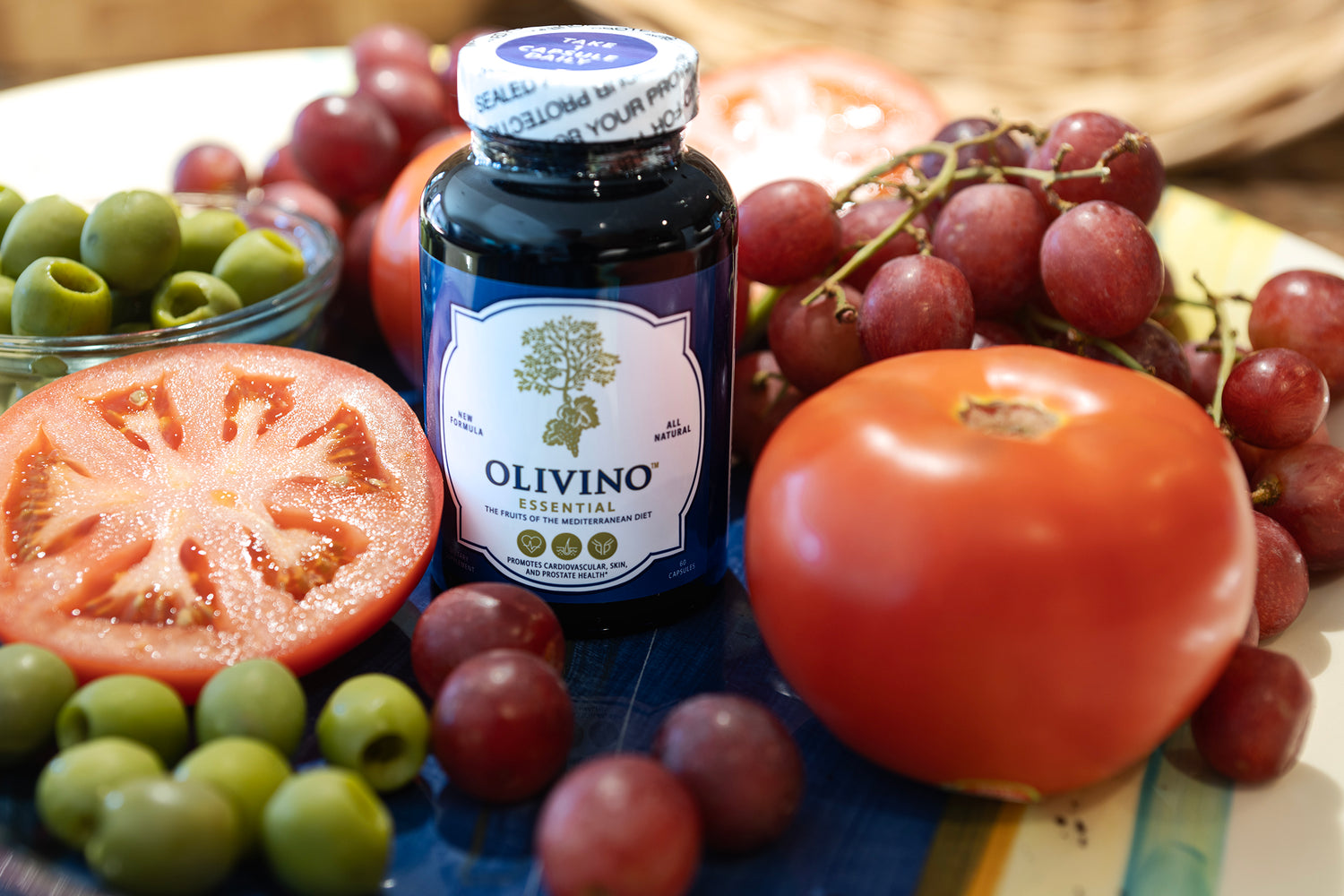The Science Behind OlivinoLife

TOMATO EXTRACT AND CARDIOVASCULAR HEALTH
Effect of Tomato, Lycopene and Related Products on Blood Pressure: A Systematic Review and Network Meta-Analysis
Rattanavipanon W, Nithiphongwarakul C, Sirisuwansith P, et al. Phytomedicine. Vol. 88 (2021): 1-8.
Key Findings: This review of 11 different studies examined the effects of various forms of tomato, lycopene, and related products on blood pressure (BP) and found that a standardized tomato extract (STE) containing 10-15 mg/day of lycopene (equivalent to about five fresh tomatoes), significantly reduced systolic BP approximately 5.89% compared to placebo. The effect on diastolic BP was not significant in those without hypertension. However, in hypertensive patients, STE significantly reduced both SBP and DBP, by 8.09% and 4.25%, respectively, from baseline. Other forms of tomato, including different doses of standardized tomato extract, tomato-containing diets, lycopene-free preparations, and synthetic lycopene, did not consistently significantly reduce either SBP or DBP
Effect of Tomato Nutrient Complex on Blood Pressure: A Double Blind, Randomized Dose Response Study
Wolak T, Sharoni Y, Levy J, et al. Nutrients. Vol 11 (2019): 1-13.
Key Findings: This study found that a Tomato Nutrient Complex (TNC) containing 15 or 30 mg lycopene effectively lowered systolic blood pressure in people with hypertension. However, lower doses of TNC or pure lycopene alone didn't have the same effect. Since raw tomatoes only contain about 2.5-4 mg of lycopene per 100 grams, eating tomatoes alone may not provide enough lycopene to reduce blood pressure. Therefore, it's recommended to include other lycopene-rich foods like tomato products or supplements in your daily diet.
Whole Food Versus Supplement: Comparing the Clinical Evidence of Tomato Intake and Lycopene Supplementation on Cardiovascular Risk Factors
Burton-Freeman, BM, Sesso HD. Advances in Nutrition. Vol 5 (2014): 457–485.
Key Findings: In this review, 3 studies showed that 15 mg/day lycopene for 6–8 weeks decreased both systolic and diastolic BP. The benefits were apparent in individuals with stage 1 hypertension who were otherwise healthy. Two other studies reported no differences in BP after lycopene supplementation at similar doses and duration. Overall, the data for tomato products suggest that a higher initial BP results in more favorable declines in BP, such that those with prehypertension or hypertension may be better indicated for improvements in BP.
Effects of Lycopene Supplementation on Oxidative Stress and Markers of Endothelial Function in Healthy Men
Kim JY, Paik JK, Kim OY, et al. Atherosclerosis. Vol. 215 (2011): 189-95.
Key Findings:This study examined the effect of6 or 15 mg lycopenein 126 healthy men daily for8 weeks. Those who took15 mg of lycopene dailyhad the most improvement. Theirblood vessels functioned better, and they hadless oxidative stress, which is linked to various health problems. Interestingly, thebenefits were greater for those who initially had poorer blood vessel function. Overall, increasing lycopene levels in the blood seemed to improve blood vessel health and reduce oxidative stress, suggesting it could be beneficial for heart health.
The Effects of Natural Antioxidants from Tomato Extract in Treated but Uncontrolled Hypertensive Patients
Paran E, Novack V, Engelhard YN, et al. Cardiovascular Drugs and Therapy. Vol. 23 (2009): 145-51.
Key Findings: This study examined the effect of 250 mg Lyc-O-Mato® containing 15 mg lycopene in 54 subjects with hypertension (aged 46-66). Those who took the tomato extract experienced a significant drop in their systolic blood pressure (13-15 points); diastolic blood pressure decreased by around 4-8 points. This drop in blood pressure was not seen when they took the placebo. Overall, adding tomato extract to the existing medications of people with hypertension resulted in a clinically significant reduction in blood pressure, with no reported side effects and high compliance with the treatment. This suggests that lycopene from tomatoes could play a role in lowering blood pressure in people with hypertension.
Natural Antioxidants from Tomato Extract Reduce Blood Pressure in Patients with Grade-1 Hypertension: A Double-Blind, Placebo-Controlled Pilot Study.
Engelhard YN, Gazer B, Paran E. American Heart Journal. Vol. 151 (2006): 100.e1-100.e6.
Key Findings: In this study, daily oral supplementation of carotenoid-rich tomato extract containing 15 mg lycopene for 8 weeks significantly decreased systolic blood pressure by almost 7% and diastolic blood pressure by more than 4.5%.
TOMATO EXTRACT AND SKIN HEALTH
The Effect of Tomato and Lycopene on Clinical Characteristics and Molecular Markers of UV-Induced Skin Deterioration: A Systematic Review and Meta-Analysis of Intervention Trials
Zhang X, Zhou Q, Qi Y, et al. Critical Reviews in Food Science and Nutrition. Vol. 63 (2023): 1-20.
Key Findings: This review examined how eating tomatoes and lycopene, a bioactive found in tomatoes, can protect skin from damage in healthy subjects. Researchers reviewed almost 20,000 research papers from five electronic databases (PubMed, Scopus, EBSCO, Web of Science, Cochrane Library). Twenty-one papers met the inclusion criteria. A total of 968 subjects, aged 18 to 73 were studied. Interventions included tomato, tomato paste, extracts of tomato and lycopene-rich product with dosages ranging from 2.4 mg/day to 28.8 mg/day; intervention duration ranged from 4 to 24 weeks. Overall, supplementing with tomato extract and lycopene were associated with significant reductions in Δa* (a measure of changes in skin redness caused by sunlight), MMP-1 (Matrix Metalloproteinase-1, an enzyme that breaks down skin collagen, leading to wrinkles and aging), ICAM-1 (Intercellular Adhesion Molecule-1, a protein that appears when the skin is damaged from sunburn) and skin pigmentation. Supplementation with tomato and lycopene was associated with significant increase in skin thickness, skin density and MED (Minimal Erythema Dose, a measure of the lowest amount of UV radiation that causes skin to turn red (erythema). Participants who took tomato or lycopene supplements had less redness in their skin after sun exposure, and their skin looked better. These supplements also increased the skin's thickness and density, which is good for keeping it healthy. This suggests that foods rich in lycopene, like tomatoes, could be like a natural sunscreen, protecting our skin from the sun's harmful effects.
Effect of Lumenato a Tomato Derived Oral Supplement on Improving Skin Barrier Strength
Tarshish E, Hermoni K, Muizzuddin N. Skin Research and Technology. Vol. 11 (2023): 1-8.
Key Findings: This study explored how taking a supplement containing carotenoids derived from tomatoes could improve the strength of the skin's protective barrier, leading to healthier and more youthful-looking skin. A group of 60 women, aged 35-55, took either the carotenoid supplement or a placebo for 3 months. The tomato extract supplement, Lumenato, a softgel capsule obtained from yellow tomato pulp, contained a proprietary mix of tomato carotenes standardized to 10 mg total carotenoids predominantly phytoene and phytofluene, as well as other naturally occurring tomato phytonutrients Researchers measured skin health and barrier function by measuring water loss through the skin and how resistant the skin was to disruption. They also measured skin firmness and elasticity. After 12 weeks, the group taking the carotenoid supplement had significantly stronger skin barriers. Additionally, their skin showed improvements in firmness and elasticity compared to the placebo group. These findings suggest that taking the carotenoid supplement could be beneficial for maintaining healthy and youthful skin.
Molecular Evidence That Oral Supplementation with Lycopene or Lutein Protects Human Skin Against Ultraviolet Radiation: Results from a Double-Blinded, Placebo-Controlled, Crossover Study
Grether-Beck S, Marini A, Jaenicke T, et al. British Journal of Dermatology. Vol. 176 (2017): 1231-1240.
Key Findings: This placebo-controlled, double-blinded, randomized, crossover study assessed the capacity of a lycopene-rich tomato nutrient complex (TNC, containing 5 mg lycopene) and a lutein-containing nutritional supplement (10 mg lutein) to protect human skin against UV radiation (UVR) in 65 healthy volunteers. They were allocated to four treatment groups and subjected to a 2-week washout phase, followed by two 12-week treatment phases separated by another 2 weeks of washout. The researchers measured the expression of certain genes when skin was exposed to UVR at various points during the study. The researchers took skin samples and blood samples to analyze gene expression and carotenoid levels. They found that TNC completely blocked the increase in gene expression caused by UVA1 and UVA/B radiation, regardless of the treatment sequence. These results suggest that TNC could protect against solar radiation-induced health damage. Olivino Essential contains the same TNC investigated in this study.
Tomato Paste Rich in Lycopene Protects Against Cutaneous Photodamage in Humans in Vivo: a Randomized Controlled Trial
Rizwan M, Rodriguez-Blanco I, Harbottle A, et al. British Journal of Dermatology. Vol. 164 (2010): 154-62.
Key Findings: This randomized controlled clinical study included 20 healthy women with a median age of 33 years. They were randomly assigned to two groups: one group consumed 55 grams of tomato paste (containing 16 mg of lycopene) mixed with olive oil daily for 12 weeks, while the other group consumed only olive oil (control). Skin redness when exposed to ultraviolet radiation (UVR) was assessed visually as the Minimal Erythema Dose (MED; a measure to determine how sensitive skin is to sunlight) and quantified using a light measuring device. Biopsies were taken from unexposed and UVR-exposed skin before and after the supplementation period. The biopsies were analyzed for a variety of specific skin proteins and levels of DNA damage. Women who ate tomato paste showed less damage to their skin from the sun and had lower levels of a protein associated with skin damage. The tomato paste group also had more of a type of protein that helps keep skin healthy. Finally, the group that ate tomato paste had fewer missing pieces in their mitochondrial DNA after sun exposure. This suggests that eating tomato paste with lycopene might help protect skin from both short-term and long-term damage caused by the sun.
Supplementation with Tomato-Based Products Increases Lycopene, Phytofluene, and Phytoene Levels in Human Serum and Protects Against UV-Light-Induced Erythema
Aust O, Stahl W, Sies H, et al. International Journal for Vitamin and Nutrition Research. Vol. 75 (2005): 54-60.
Key Findings: This study investigated the photoprotective effects of synthetic lycopene in comparison with a tomato extract (Lyc-o-Mato—the same extract used in Olivino Essential) and a drink containing solubilized Lyc-O-Mato (Lyc-O-Guard-Drink). Volunteers ingested similar amounts of lycopene (about 10 mg/day). At weeks 0, 4, and 12, skin on the back of the hand was exposed to solar light to induce redness/inflammation. Reddening of the skin was evaluated before and 24 hours after irradiation. A decrease in skin redness was observed in all groups. Compared to week 0, the skin redness at week 12 was 25% lower in the synthetic lycopene group. The protective effect was more pronounced in the Lyc-o-Mato group (38%) and Lyc-o-Guard-Drink (48%) groups. In the two latter groups, phytofluene and phytoene may have contributed to protection. Olivino Essential contains 10 mg of lycopene from Lyc-o-Mato.
Dietary Tomato Paste Protects Against Ultraviolet Light-Induced Erythema in Humans
Stahl W, Heinrich U, Wiserman S, et al. Journal of Nutrition. Vol. 131 (2001): 1449-1451.
Key Findings: This examined whether eating a natural source of lycopene could protect the skin from sunburn. Researchers gave 9 volunteers 40 grams of tomato paste (which contains about 16 milligrams of lycopene) mixed with olive oil every day for 10 weeks. A control group of 10 people only received olive oil. They then exposed the skin on their backs to simulated sunlight at the start of the study, after 4 weeks, and again after 10 weeks, and measured how red their skin became after each exposure. Volunteers who ate the tomato paste had 40% less redness on their skin compared to the control group after 10 weeks. This suggests that regularly consuming lycopene can help protect skin from getting burnt by the sun's UV rays.

BENEFITS BACKED BY SCIENCE
- Promotes cardiovascular health
- Helps maintain healthy blood pressure
- Fights inflammation
- Protects against free radicals that can damage skin
- Helps maintain a healthy blood sugar level
- Promotes healthy prostate function


